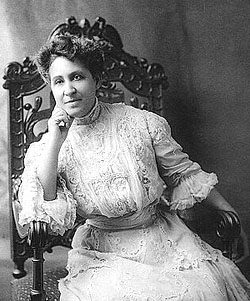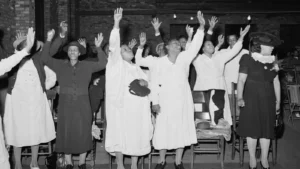Lumsden delves into the social climate during the publication of Treemonisha—particularly pointing out the erasure of Black women of the time. Lumsden points out women from multiple fields including musician Harriet Gibbs Marshall and author Ida B. Wells, and the focus of this article, public speaker Mary Church Terrell. Though the women occupy different aspects of the worlds of art & literature and may have had differing opinions, they circle around a common goal—the advancement for Black women.

Terrell was born to a well-off family in Memphis in 1863, and is most renowned for her presidency with the National Association of Negro Women. She was a leader in Black womens’ suffrage and integration. She also spoke of intersectionality long before written discourse of the topic became the norm saying ”A white woman has only one handicap to overcome—a great one, true, her sex; a colored woman faces two—her sex and her race. A colored man has only one—that of race.” As a woman of the Black upper class, she put her privilege to bring awareness to Black advancement. However, no figure is without critique. It must be noted that Terrell’s role in upholding respectability politics excludes lower-class Black women & comes off as elitist under a 21st-century view.

Scott Joplin went beyond the beaten path when composing Tremonisha. Though the movement to uplift the Negro race was gaining traction, Black men were pushed to the forefront along with some misogynositic & one-track minded views on Black women, their behaviors & actions. On the contrary, Black women are minimized despite their contributions and achievements. Yet, in a world of Booker T’s, Joplin made room for Treemonishas and Lucys. Treemonisha, a Black woman from the rural South that dwells far from the ideal & domesticated Black woman, is a beloved & educated community leader. As a result, Joplin emphasized education and the importance of the Black woman presence in racial advancement.
To conclude, the contributions of women like Terrell are incorporated into fictional works such as Treemonisha as the work erases labels. The coupling of intersectionality and the absolution of gender roles was seen with the creation of Treemonisha—which starred a Black woman from the rural South that dwells far from the ideal & proper Black woman.
Wanna Read More?
Lumsden, Rachel. (2015). Uplift, Gender, and Scott Joplin’s Treemonisha. Black Music Research Journal, 35(1)

A Century of Gospel: 1920 to 2020
Introduction The gospel portion was one I was really looking forward to beginning Survey of African-American Music. I was raised in church, and to be
Strange Fruition–Nina Simone’s Impact on Folk Music
Folk music, in particular, invokes an emotional response from its listeners. The music shows itself to be raw at times and can often express emotions
Marian Anderson Brings Spirituals to the National Stage
Nearly four score after the signing of the Emancipation Proclamation that released African-Americans from bondage, Marian Anderson utilized the genre morphed from slavery to stand
Zion Harmonizers–Staples of the Transitional Era
https://www.youtube.com/watch?v=uL0cGLue-iE In 2019, the Zion Harmonizers celebrated their Diamond Jubilee. That same year, they took part in the 50th annual Jazz Fest, a spot the
Spirituality Meets Song: An Analysis of Coltrane’s A Love Supreme
John Coltrane’s 1965 album A Love Supreme is amongst his best-selling and highest acclaimed. The album exceeded the saxophonist’s usual album sales sixfold & stood
You Thought White Folks’ Stealing “Cadillac Car” Was Bad? Talk to Big Mama Thornton.
https://www.youtube.com/watch?v=1jXM1OEP5oshttps://www.youtube.com/watch?v=yoHDrzw-RPg The 2006 film “Dreamgirls” is undoubtedly my favorite movie. It’s one of the first movies I have vivid memories of seeing in theaters as

